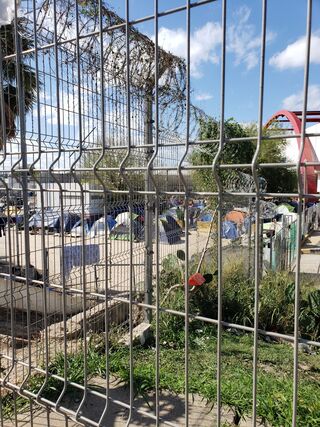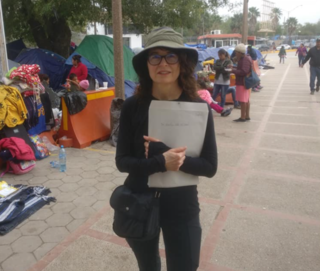Health
Jenifer Wolf-Williams: Psychological Support for Migrants
Interviewing the director of Humanitarian Outreach for Migrant Emotional Health.
Posted April 14, 2022 Reviewed by Vanessa Lancaster
Key points
- One non-profit focuses humanitarian efforts on the forensic mental health assessments for immigrants at the southern border.
- Clients report intrusive memories, re-experiences, nightmares, insomnia, fear, and isolation to the point of dysfunction.
- The forensic assessments serve as evidence when the immigrants appear before asylum officers or immigration courts.

Controversies related to U.S. immigration policy at the southern border are again in the news.
Current debates include the planned termination of Title 42, which authorizes the expulsion of migrants based on public health provisions, and concerns over disparate treatment, with asylum-seekers from Ukraine entering the U.S. while entry is blocked for those from Central America and Haiti.
But regardless of how these and other high-profile political disputes unfold, a variety of non-profit groups are working daily to provide support to the vulnerable individuals and families currently residing in makeshift camps near the Mexican border.
One such organization–Humanitarian Outreach for Migrant Emotional Health (H.O.M.E.)–has an explicitly psychological focus.
I recently had the opportunity to interview H.O.M.E.’s executive director, Jenifer Wolf-Williams, EdD, LPC-S, LPA. The interview that follows has been lightly edited for length and clarity.
RJE: Jenifer, can you tell us about H.O.M.E. and the work that it does?
JWW: We primarily provide forensic mental health assessments for immigrants in need, especially those in southern border regions. Our clinicians document our clients’ trauma histories, the emotional impact of their experiences, and their fear of return to danger. These documents then serve as evidence when they appear before asylum officers or in immigration courts.
Our clients include mothers and children fleeing violent drug cartels, individuals who escaped political torture, women fleeing violent partners in places where police will not protect them, and girls fleeing forced marriage, sexual violence, and female genital mutilation. Many of them are now trapped in the camps and shelters of northern Mexico.
RJE: How does H.O.M.E. make a difference for migrant communities?
JWW: Our work changes lives. Families separated by national borders are allowed to reunite. Girls threatened with sexual violence are granted legal protections. Women are protected from violent partners with cartel connections. In their evaluations, they have expert support for the daunting challenge of presenting their most intimate and traumatic experiences to a court or to a uniformed officer. They have a voice. We also advocate that individual and societal mental health are imperative to good immigration policy.
RJE: Can you tell us more about the circumstances of the people you’re trying to help at the border?
JWW: The brutal truth is that they are in danger at every turn. Our clients have already fled their homes in desperate attempts to stay alive. They are already traumatized. They are stateless and unprotected against ever-present cartel violence. Mothers, fathers, children–it doesn’t matter. Now they are literally at the gates of the U.S. but are still targeted, often by members of the same cartels or para-government groups as before. Every day, our clinicians hear from clients who were kidnapped from their tents or shelters, raped, beaten, and threatened.
RJE: You’ve described your clients as traumatized. What are the psychological effects that you’re seeing among these individuals and families?
JWW: Clients report intrusive memories, re-experiences, nightmares, insomnia, fear, and isolation to the point of dysfunction. Their current environment isn’t much different from the one they fled, so their trauma symptoms are constantly triggered. It’s not safe for them to become less vigilant. Severe depression is also common, including suicidality. They’re not eligible for local health care, and it wouldn’t be safe for them to travel across town if they were.
RJE: What kind of protection are your migrant clients seeking? And how does a mental health evaluation help with that?
Humanitarian parole is emergency, temporary permission to enter the U.S. It allows our clients to reach immediate safety with family or friends, to receive needed health care, and to file for asylum. Asylum is permanent legal protection similar to refugee status. It is difficult to attain. The national grant rate hovers around 30 percent. Cases supported by an attorney have grant rates of about 60 percent. Cases that also include support from a health or mental health professional have grant rates around 90 percent.
RJE: Your work sounds very interesting, but it’s not what grad school prepares us for. What drew you to this work, Jenifer?
JWW: That question always challenges me, and I’ll start by simply saying that I don’t know how I could possibly turn away.
I grew up in rural Kansas and was ignorant about both racism and immigration. But in my twenties, my husband and I buckled our baby into her car seat and drove toward Tegucigalpa, Honduras, where he had accepted an academic position. As soon as we crossed into Guatemala, we knew something was wrong.
Soldiers with machine guns stopped us every few miles for unexplained, lengthy inspections. Only much later did we learn that their armies were slaughtering indigenous communities nearby. Once we arrived in Honduras, life was calm, but traumatized survivors from neighboring countries kept arriving.
Central Americans, including Hondurans, flee their countries every day now, as do survivors from across the globe. I’m grateful that we can help a few find safety.

RJE: Have you always worked with immigrants?
JWW: No, but I’ve always connected with immigrant communities. I learned about immigration injustice over time and eventually shifted my clinical focus to asylum seekers.
Initially, I offered pro bono trauma therapy, but I quickly learned that therapy was not enough. My first job as a trauma therapist was to help my clients learn to feel safe. But they weren’t safe. Without legal status, they faced the constant danger of forced return to the places they had fled. That’s how I came to focus on assessment.
Forensic assessment is the space in which a mental health professional has the clearest voice. Our written testimony speaks for the traumatized asylum seeker struggling to recount their story and explain their needs. We educate the court about the normal effects of trauma on memory and testimony. Over time, we see patterns and are better equipped to address connections between policy and mental health.
RJE: What can mental health professionals and others do to help?
JWW: I welcome contact from anyone who is moved by this work. I’m happy to tell you more about our mission and discuss how you can be part of what we do. Mental health professionals can apply to participate as evaluators. Our clinicians receive stipends for their work, and we also welcome committed volunteers.
We have a dedicated and compassionate clinical team, and we’re always looking for new participants who build expertise with each case. If I may add one more point, another way to help is with financial support. The number of families seeking safety keeps growing, and attorneys in the border regions tell us they can send us as many cases as we’re able to effectively manage.
RJE: Thanks very much, Jenifer.




